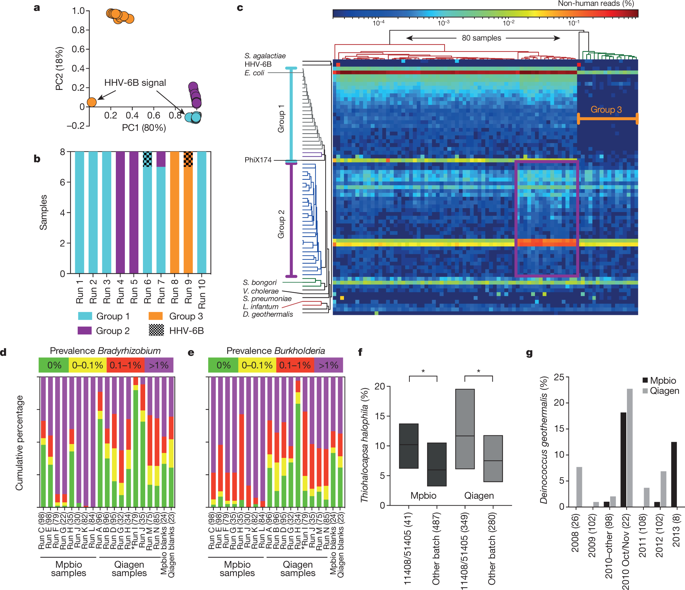Our official English website, www.x-mol.net, welcomes your
feedback! (Note: you will need to create a separate account there.)
Human placenta has no microbiome but can contain potential pathogens
Nature ( IF 50.5 ) Pub Date : 2019-07-31 , DOI: 10.1038/s41586-019-1451-5
Marcus C de Goffau 1, 2 , Susanne Lager 3, 4, 5 , Ulla Sovio 3, 4 , Francesca Gaccioli 3, 4 , Emma Cook 3 , Sharon J Peacock 1, 6, 7 , Julian Parkhill 1, 2 , D Stephen Charnock-Jones 3, 4 , Gordon C S Smith 3, 4
Nature ( IF 50.5 ) Pub Date : 2019-07-31 , DOI: 10.1038/s41586-019-1451-5
Marcus C de Goffau 1, 2 , Susanne Lager 3, 4, 5 , Ulla Sovio 3, 4 , Francesca Gaccioli 3, 4 , Emma Cook 3 , Sharon J Peacock 1, 6, 7 , Julian Parkhill 1, 2 , D Stephen Charnock-Jones 3, 4 , Gordon C S Smith 3, 4
Affiliation

|
We sought to determine whether pre-eclampsia, spontaneous preterm birth or the delivery of infants who are small for gestational age were associated with the presence of bacterial DNA in the human placenta. Here we show that there was no evidence for the presence of bacteria in the large majority of placental samples, from both complicated and uncomplicated pregnancies. Almost all signals were related either to the acquisition of bacteria during labour and delivery, or to contamination of laboratory reagents with bacterial DNA. The exception was Streptococcus agalactiae (group B Streptococcus), for which non-contaminant signals were detected in approximately 5% of samples collected before the onset of labour. We conclude that bacterial infection of the placenta is not a common cause of adverse pregnancy outcome and that the human placenta does not have a microbiome, but it does represent a potential site of perinatal acquisition of S. agalactiae, a major cause of neonatal sepsis.The human placenta does not have a microbiota, suggesting that bacterial infection of the placenta is not a common cause of adverse pregnancy outcome, but group B Streptococcus is found in approximately 5% of placental samples.
中文翻译:

人类胎盘没有微生物组,但可能含有潜在的病原体
我们试图确定先兆子痫、自发性早产或小于胎龄婴儿的分娩是否与人类胎盘中细菌 DNA 的存在有关。在这里,我们表明,没有证据表明大多数胎盘样本中存在细菌,无论是复杂妊娠还是简单妊娠。几乎所有信号都与临产和分娩过程中细菌的获取有关,或者与实验室试剂被细菌 DNA 污染有关。无乳链球菌(B 组链球菌)是个例外,在临产前收集的样本中约 5% 检测到无污染信号。我们的结论是,胎盘细菌感染并不是不良妊娠结局的常见原因,并且人类胎盘没有微生物群,但它确实代表了围产期获得无乳链球菌的潜在部位,无乳链球菌是新生儿败血症的主要原因。人类胎盘没有微生物群,这表明胎盘细菌感染并不是不良妊娠结局的常见原因,但大约 5% 的胎盘样本中发现了 B 族链球菌。
更新日期:2019-07-31
中文翻译:

人类胎盘没有微生物组,但可能含有潜在的病原体
我们试图确定先兆子痫、自发性早产或小于胎龄婴儿的分娩是否与人类胎盘中细菌 DNA 的存在有关。在这里,我们表明,没有证据表明大多数胎盘样本中存在细菌,无论是复杂妊娠还是简单妊娠。几乎所有信号都与临产和分娩过程中细菌的获取有关,或者与实验室试剂被细菌 DNA 污染有关。无乳链球菌(B 组链球菌)是个例外,在临产前收集的样本中约 5% 检测到无污染信号。我们的结论是,胎盘细菌感染并不是不良妊娠结局的常见原因,并且人类胎盘没有微生物群,但它确实代表了围产期获得无乳链球菌的潜在部位,无乳链球菌是新生儿败血症的主要原因。人类胎盘没有微生物群,这表明胎盘细菌感染并不是不良妊娠结局的常见原因,但大约 5% 的胎盘样本中发现了 B 族链球菌。































 京公网安备 11010802027423号
京公网安备 11010802027423号